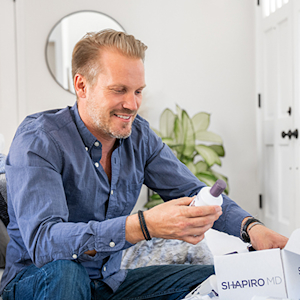9 Simple Remedies to Stop Hair Loss
2021-07-15
Running your hand through your hair and finding a fistful of loose strands can be a downright frightening thing.
In many cases though, you have the power to combat the problem and begin growing new and healthier hair.
Here are some simple tips on how to stop hair loss and support healthy hair & growth.
1. Consume More Protein, Iron and Omega-3s
Healthy hair growth is dependent on getting adequate protein and Omega-3s through your diet. Protein is essential to hair growth since hair is primarily made from the protein keratin. If your body isn’t getting enough protein, it can cut back the protein supply to your hair, and you may experience hair loss. Eggs, salmon, nuts and meat are excellent sources of protein to incorporate into your diet.
Hair loss due to an iron deficiency is common since iron aids in the production of hemoglobin, which is crucial to growth. This mineral is naturally occurring in red meat, poultry and fish, so vegetarians and vegans especially must be careful to get enough and supplement if diet cannot naturally deliver the iron needed.
Omega-3s fatty acids are vital to many bodily processes, including hair growth, but the body can’t create them so they must be absorbed through diet. These are naturally occurring in some fatty fish and other seafood but can be difficult to get a sufficient amount of naturally, so many people supplement with fish oil.
Studies have shown those who take fish oil supplements have increased hair growth and healthier hair.
2. Add More Vitamins
A vitamin-rich diet is a strong defense against hair loss. They should be absorbed naturally from food in the diet when possible, but supplements also work.
Vitamin A plays an important part in cell growth, including hair. It also helps produce sebum, an oily substance that keeps the scalp moisturized and helps hair stay healthy. Sweet potatoes, pumpkins and spinach are all great sources of beta-carotene, which turns into vitamin A.
The B-vitamins also are vital to hair growth, particularly biotin which is often used as part of a hair-loss treatment plan. Those with a deficiency of B12 can experience hair loss. B-vitamins can be naturally found in many foods, including whole grains, leafy greens and animal-based foods such as meat and dairy.
Vitamin C helps your body absorb iron which is necessary for hair growth. It also is vital to the body’s production of collagen which is essential to hair structure. Citrus fruits, peppers and strawberries are good sources of vitamin C.
Vitamin D deficiencies have been linked to alopecia, and research has shown that vitamin D helps create new hair follicles. Many people suffer from a lack of vitamin D and it can be difficult to get the necessary amount through diet alone. It can be found, though, in some fish, certain mushrooms and fortified dairy products.
Studies have shown that vitamin E plays a role in increasing hair growth in those with hair loss. Sunflower and soybean oil, almonds, peanuts and peanut butter and greens are excellent sources of vitamin E.
3. Massage Your Scalp
One of the simplest things you can do to stimulate hair growth is a daily scalp massage. Research shows that scalp massages increase hair thickness and improve alopecia. This encourages the follicles to grow healthier and thicker hair. Massages also help with promoting blood circulation to the area.
Scalp massage can be done simply with fingers or with special tools and brushes. You can even hire a professional masseuse to perform a scalp massage.
If you're using your hands, you can do your daily massage whenever you like, including in the shower. Simply move your fingertips in circles over your scalp using medium pressure. Work from front to back or side to side, making sure to cover the entirety of yourself. Do this for about five minutes each time, multiple times a day.
There are many scalp massagers available on the market if you choose to go that route too. Some dermatologists believe a scalp massager is more effective, but there are those who find these tools uncomfortable and prefer the fingertip method.
4. Use Essential Oils
Many people swear by essential oils to promote hair growth. Both lavender and peppermint have been shown to help hair growth in animal studies. Use this easy essential oil treatment weekly to stimulate your scalp:
Mix a drop or two of your oil of choice into what's called a carrier oil, such as melted coconut oil. Then, take that mixture and gently massage it into your scalp, using your fingertips to massage as you go. Once it’s thoroughly saturated, cover your hair in a shower cap or towel and leave it for up to an hour. Rinse it out, shampooing your hair and styling it as usual.
5. Brush Gently
Hair loss can be caused by over-brushing, using the wrong brush or brushing at the wrong time. It’s essential that you are gently brushing with the right brush.
Paddle brushes are good for most hair types and situations, with sturdier bristles available for thicker and more textured hair. Round brushes are perfect for blowouts and come in a variety of sizes and with many bristle options. Loop brushes are ideal for those with hair extensions, as the loop style of the bristle makes brushing extensions a breeze with no damage.
Hair is most prone to breaking when it is wet, so it's important to choose a wet-hair-friendly tool when brushing it. Your best options are a strong wide-toothed comb or a detangling brush made specifically for wet hair use. Both of these options will limit the damage and minimize hair loss.
6. Minimize Heat Tool Use
Hairdryers, curling irons, and straighteners may seem like a godsend when it comes to hair styling, and they all definitely have their benefits. One of their consequences, though, is dry, damaged hair.
It can be quite the cycle: You dry and style your hair using heat, the heat damages the hair making it more brittle and frizzy, so you use more heat styling to tame it. This process only makes it more likely to break off or fall out!
Luckily, cutting back on the use of heat tools can have significant positive effects. Let your hair dry naturally whenever you can, giving it a break from the heat of the blow dryer. Choose a brush specially made for speedy blow drying so that your hair spends less time under direct heat. Use tools like straighteners and curling irons sparingly, and apply hair masks and treatments to help minimize the damage from heat.
7. Avoid Tight Hairstyles
Some forms of hair loss are caused by the repetitive stress on hair caused by pulling and stretching it into tight hairstyles such as elaborate braids or tight ponytails. Traction alopecia is a prominent kind of hair loss that can often be reversed by stopping the frequent practice of hairstyles that put extra strain on your scalp and hair follicles. Use scrunchies or soft materials to tie up your hair, and keep the style loose and low on your scalp when possible.
8. Don’t Overprocess Hair
While using chemicals to dye and style hair in moderation may not cause extensive damage, using them frequently can cause hair to become especially brittle and prone to breakage. Especially if you are using bleach, you need to make sure not to process your hair too often as the damage from it can be significant and irreversible with hair loss a very real possible consequence. Thankfully, taking a break between dyeing or processing can help to minimize the chance of hair loss.
9. Reduce Stress
Long-term or incidental stress can both have a serious impact on hair health. If you're experiencing high stress in your life, it can cause your hair to go into a phase where it won’t produce new hair! Consider finding ways to limit or cope with stress by eliminating unnecessary stressors in your life and practicing positive stress management tools like meditation. If you can cut down on your stress, your hair may respond to produce new hair again.
Hair loss can be scary, but it doesn't have to be permanent. Shapiro MD's hair growth experts are here to help, with custom prescriptions and easy-to-use FDA-approved options like minoxidil, all available online. Click here to start out unique hair quiz – and get the right plan for you – today.
Sources
https://food.ndtv.com/beauty/iron-and-protein-getting-to-the-root-of-hair-loss-768613
https://www.onegoodthingbyjillee.com/ways-to-reduce-hair-loss/
https://www.luxyhair.com/blogs/hair-blog/your-ultimate-hairbrush-guide


